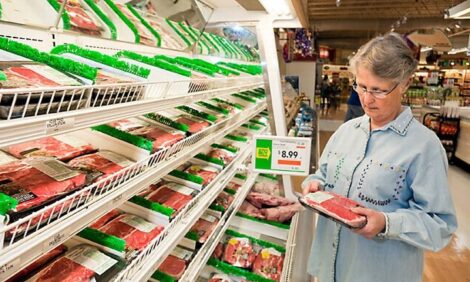



Westfleisch Stable and Sustainable
GERMANY - Despite decline of prices Westfleisch eG Muenster achieved a turnover of € 1.9 billion in the last financial year.During the period the pig meat processor slaughtered 6.2 million pigs slaughtered and saw just under 40 per cent of its business go to the export markets.
Speaking at the annual meeting last month Dr Helfried Giesen, Executive Board Member said that German consumers still like meat.
The company reported that the trunover of €1.887 billion was against a backdrop of weaker domestic demand and volatile export markets.
The lower prices in 2009 compared to the previous year led to a six per cent drop in turnover.
The volume of sales dropped by a total of 0.9 per cent to 813,000 tons.
According to Dr Giesen the world-wide financial and economic crisis led to a drop in turnover in the food industry as a whole.
Westfleisch eG slaughtered more pigs but fewer cattle. In 2009, around 6.22 million pigs and sows -an increase of 1.5 per cent - as well as 358,000 cattle and calves were processed in the meat plants of the Westphalian group.
In the productive livestock segment our cooperative marketed 1.85 million piglets compared to 1.644 million in the previous year's period. This equals a 14.6 per cent growth.
Demand for Meat Unbroken
In all 58 per cent of the meat produced by Westfleisch ended up on German plates.
The overall meat consumption of the Germans rose slightly to 58.5 kg in the previous year.
“This can safely be regarded as pleasing for the agricultural producers, the meat industry and the food retailers,“ Dr Giesen said.
"The upward tendency in meat consumption and the consumers' returning confidence in environmentally friendly production is supported by our company through the 12 key facts of the “Qualitaetspartnerschaft Westfleisch“ that was launched three years ago.
Climate protection, life cycle assessment and sustainability were also playing an increasingly important role in the interaction between producers, trade and consumers. Environmental protection and animal welfare as well as important social and societal requirements are stipulated in the modules in addition to quality standards."
For the first time in its 82-year history the group presented a sustainability report at the general meeting.
This report is industry-wide the first to fulfil – independently confirmed by the renowned certification body SGS Germany GmbH – the extensive and internationally recognised GRI (Global Reporting Initiative) criteria.
It achieved the assessment “B+“. The basis of a report according to GRI is transparency and its aims are standardisation and comparability.
Dr Giesen said: “By this, we document the aspects developed by the Qualitaetspartnerschaft Westfleisch and show verifyably the way in which our group takes economic, ecological and social issues into account and handles them sustainably.“
Westfleisch was also the first company in the meat industry to issue a carbon footprint for the entire process chain in the production of pork at the beginning of 2010 against the background of the debate about meat consumption.
The production of 1 kg of pork meat at Westfleisch generates 3.2 kg of CO2 equivalents, which is comparable to the emissions caused by a 20 km trip in a medium-sized vehicle.
“In the future, Westfleisch will be able to score highly in terms of climate protection and sustainability,“ Dr Giesen said.








